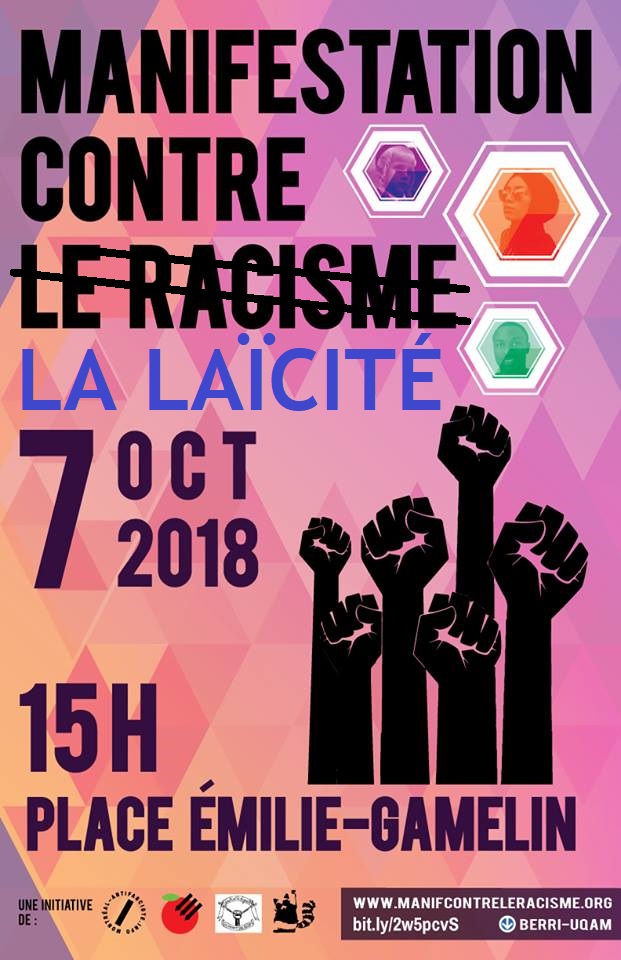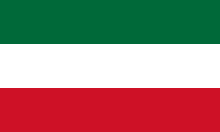2018-10-16
I criticize a particulary dishonest editorial, recently published by the Toronto newspaper The Globe and Mail, which opposes secularism and denounces the new CAQ government for doing what the newspaper itself proposes, that is, leaving the crucifix in the National Assembly. The editorialists also indulge in a little Quebec-bashing along the way.
Sommaire en français Je critique un éditorial particulièrement malhonnête, récemment paru dans le journal torontois The Globe and Mail, qui s’oppose à la laïcité et prône la même mesure qu’il dénonce chez la CAQ, c’est-à-dire, laisser le crucifix à l’Assemblée nationale. Les éditorialistes font aussi un peu de Quebec-bashing en passant.
On October 11th, the Globe and Mail published an editorial under the title: “By defending a crucifix, Quebec crosses the line into hypocrisy.” It is replete with misconceptions and misleading assertions. The key thesis of the editorial is the contrast between two announcements made by Quebec’s new CAQ government led by François Legault:
- Banning religious symbols worn by public servants in positions of authority.
- Leaving the crucifix above the speaker’s chair in the National Assembly where it is, using the excuse that it is part of Quebec’s heritage.
All secularists in Quebec agree: that crucifix must go…
There is indeed a serious inconsistency here. But the editorial declares that “Quebec” is hypocritical. No, if anyone is being hypocritical here, it is Legault and the CAQ, not Quebec or Quebeckers in general. All secularists in Quebec agree: that crucifix must go, perhaps moved to a museum. (Furthermore, the law governing the National Assembly must be modified to prohibit any future displays of religious symbols in the legislature, including symbols worn by MNAs.) And yet the Globe and Mail editorial itself calls for leaving the crucifix in place! Why? In order to justify their opposition to any ban on religious symbols. The editorialists simply want to block any progress towards secularism.
The editorial mentions that, ten years ago, the Bouchard-Taylor commission recognized that the crucifix in such a prominent place in the N.A. is a powerful symbol linking legislative power to the majority religion. Exactly! That is why it must be removed. But the editorial neglects to mention that the same Commission recommended a ban on religious symbols worn by public servants in positions of authority, very similar to what CAQ has recently proposed! (There is one important difference: CAQ would extend the ban to apply to teachers.)
Identity Politics
The editorial whines repeatedly that Quebec is indulging in “divisive identity politics.” This is a common complaint made by English-Canadian journalists in order to denigrate Quebec. Yes, leaving the crucifix could certainly be called identitarian. But the ban on religious symbols is the direct opposite of identity politics, the goal being to make the Quebec public service religiously neutral, in the same way that it is already politically neutral (because political symbols are already banned for all public servants).
The Canadian government regularly practices its own aggressive brand of identity politics by promoting dangerous cultural relativism…
When it comes to identity politics, nothing can compare to fundamentalist Islamists who aggressively promote the hijab and even the niqab as markers of identity. The Canadian government regularly practices its own aggressive brand of identity politics by promoting dangerous cultural relativism (which it euphemistically calls “multiculturalism”) as essential to the Canadian identity—and denigrating anyone who might question it, as many Quebeckers do. Canadian multiculturalism is very divisive because it attaches greater importance to ethno-religious identity than to citizenship; most importantly, it is incompatible with the secularism which most Quebeckers support.
Demonizing Secularism
The editorial is particularly tendentious when it refers to the “Parti Québécois’s odious Charter of Quebec Values.” Firstly, the name is incorrect. Secondly, the PQ Charter of Secularism was anything but odious. If adopted, it would have constituted a major step towards secularism. All secularists in Quebec supported it, as did a majority of the population. But since it contained a ban on religious symbols, the Globe and Mail hates it. It was the Charter’s opponents who were odious, slandering both the PQ government and Quebeckers in general with all sorts of egregious epithets. And now, enemies of CAQ’s proposed ban are at it again.
The editorial claims that there is “public outrage” against CAQ. Nonsense. On the contrary, there is a wave of great hope generated by the promise of this new government, and a fervent desire that it not back down in the face of the virulent opposition, such as that from the Globe and Mail.
The demo was basically a circus of anti-Quebec bigotry and fundamentalist Islam…
There was a so-called “anti-racist” demonstration held in Montreal less than a week after the CAQ victory. The demo was basically a circus of anti-Quebec bigotry and fundamentalist Islam, along with various sympathizers such as the “Antifa” (who should more properly be called “anarcho-Salafists”) who denounced the CAQ as “racist”—thus conflating race with religion in order to slander secularists. Noticeably absent, however, were those of a Muslim background who support secularism, such as AQNAL (Quebec Association of North-Africans for Secularism).
Freedom of Conscience
The employee can put their crucifix, hijab, turban, tin-foil hat, Pastafarian colander or whatever back on at the end of their shift.
But let us get to the crux (forgive the pun) of the matter: Why should religious symbols be banned for state employees, especially those in positions of authority? The answer is obvious: to protect the freedom of conscience of all citizens, who have a right to public services without staff pushing their personal ideology in the public’s face. Political symbols are already banned; this must be extended to religious ones. Such a measure does not threaten freedom of religion. On the contrary, it protects freedom of religion and freedom from religion, both of which are encompassed by freedom of conscience. The ban would only apply during working hours. The employee can put their crucifix, hijab, turban, tin-foil hat, Pastafarian colander or whatever back on at the end of their shift.
No rights are absolute, for they are limited by effects they have on the rights of others. The Globe and Mail editorial laments that CAQ would limit religious believers’ “right to express their religious beliefs as they see fit” but there is no right to practice one’s religion while on the job! The ban would have zero effect on religious practice outside the workplace.
Discrimination Against Non-Believers
…the Globe and Mail supports a world in which religious advertising is allowed everywhere…
The editorial enjoins Quebec politicians to show a “rational generosity of spirit.” Yet the Globe and Mail supports a world in which religious advertising is allowed everywhere, even on the bodies of government employees, thus threatening the rights of everyone—believer, atheist, agnostic—who does not want such propaganda imposed on them. I own several t-shirts which declare loudly and proudly that I am an atheist. But I would not wear any of them to work if I were employed in the public service, because I would not be so boorish as to push my personal convictions onto a captive audience in the workplace. I demand the same courtesy of religious believers. A rational generosity of spirit would imply accepting the duty of discretion when one works in such a position.
…the Globe and Mail promotes discrimination against atheists…
The Globe and Mail editorialists demand no such discretion from religious believers. Rather, they promote a major privilege for Roman Catholicism by leaving the crucifix in the N.A., even after hypocritically denouncing the CAQ for doing the same. The Globe and Mail then promotes privilege for all religions—to the detriment of non-believers—by opposing any ban on religious symbols in the public service. Thus, the Globe and Mail promotes discrimination against atheists and other non-believers.
Next blog: My Favourite Graph






